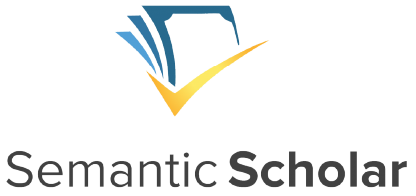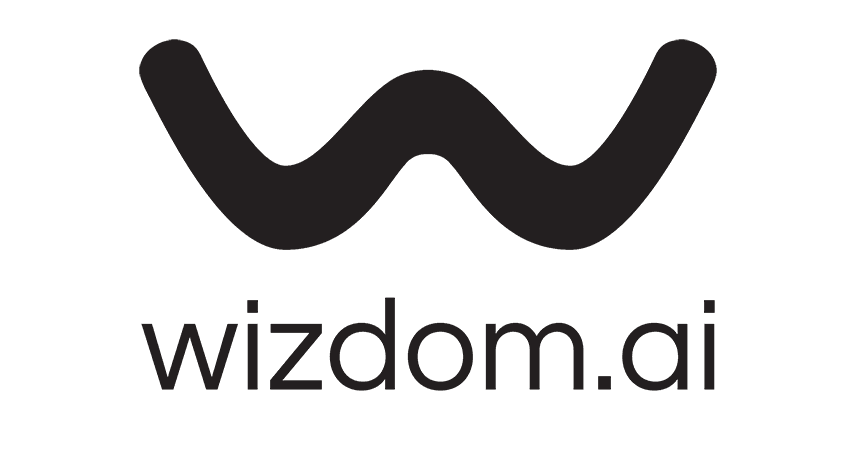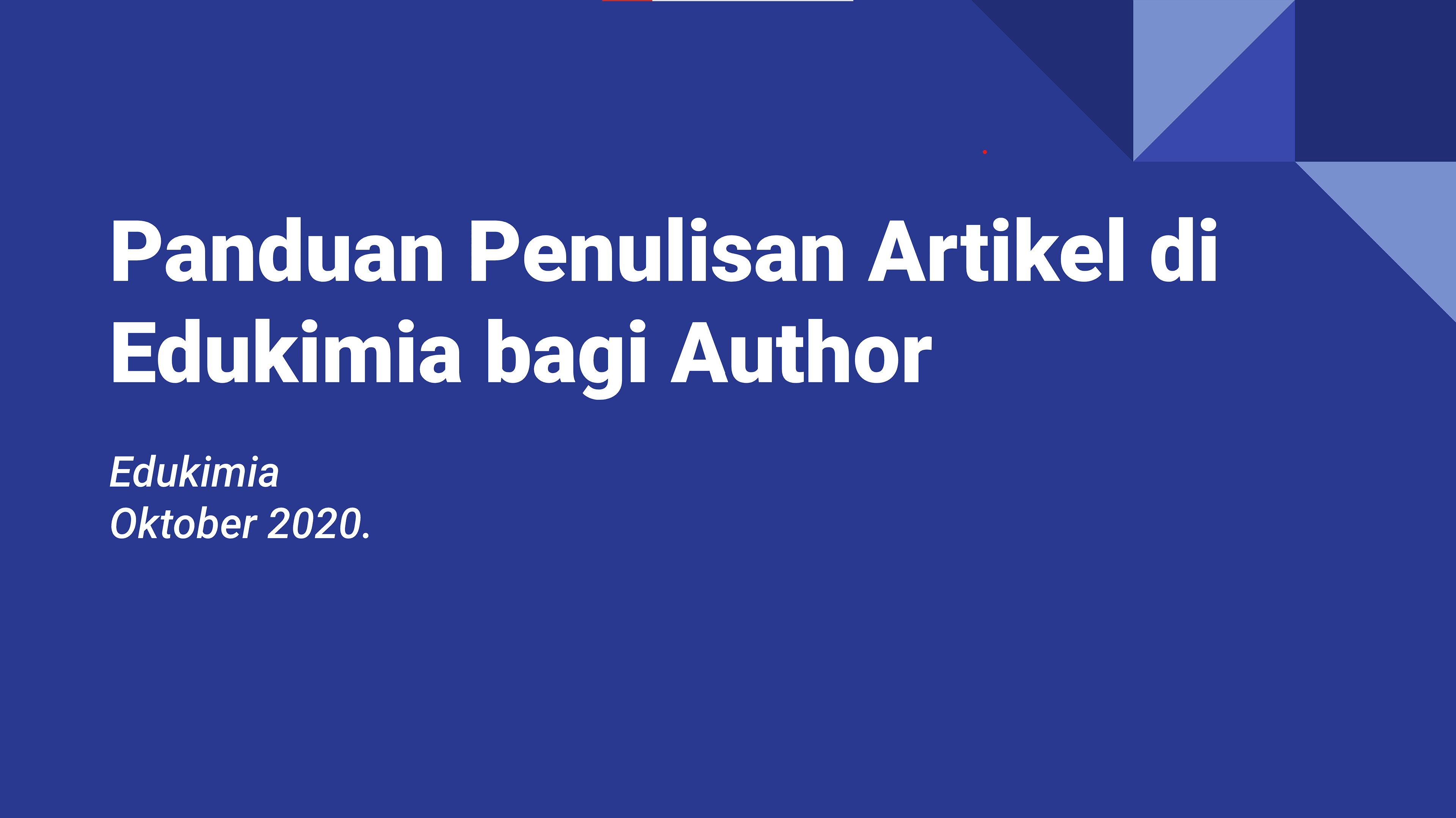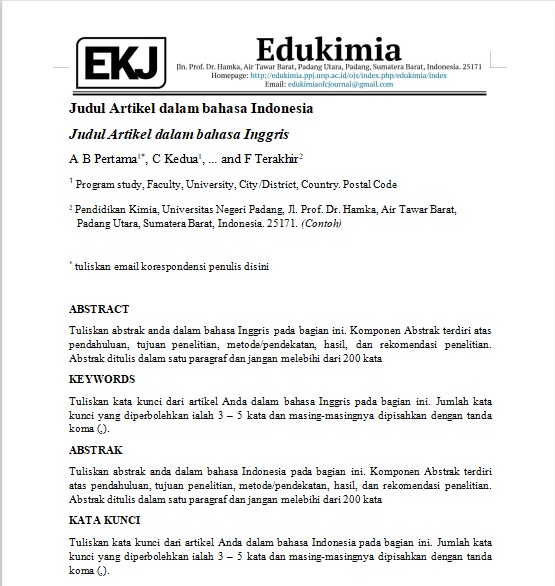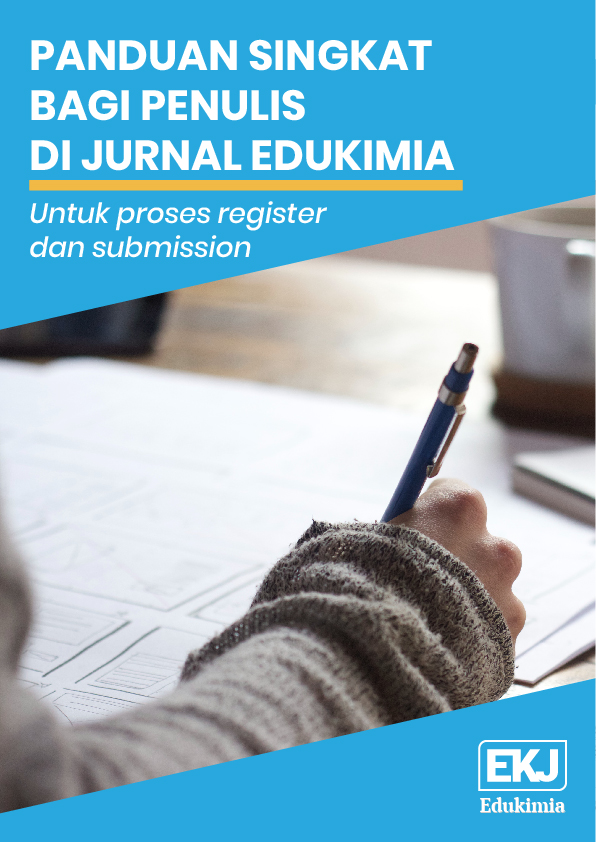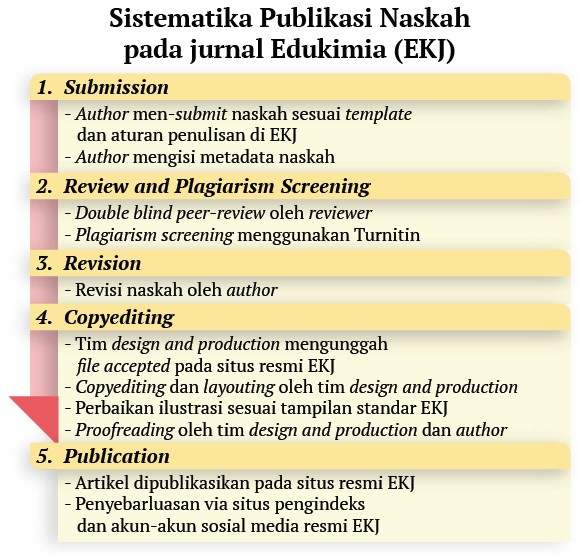Student Worksheets of Molecular Shape Topic Based on Structured Inquiry with 3-D Models Usage
Article Metrics
The abstract has been viewed for 658 times.The full pdf article has been downloaded for 581 times.
Abstract
This study is research and development (R and D) and using 4-D models, but disseminate step is not done. Validation of student worksheets has been done by chemistry lecturers and chemistry teachers. The practicality of student worksheets has been done by chemistry teachers and students of 2nd grade of SMAN 1 Pariaman. The result showed that moment kappa average of validity was 0,83 with very high validity category and moment kappa average of practicality were 0,9 by chemistry teachers and 0,86 by students with very high category. Therefore student worksheets of molecular shape based on structured inquiry with emphasis on the submicroscopic level using 3-D models is valid and practice to be used on the chemistry learning.
Keywords
References
R. Chang and J. Overby, General Chemistry The Essential Concepts, 6nd ed., New York: McGraw-Hill Companies, 2011.
Indiatiningsih, Penggunaan Media Plastisin Untuk Meningkatkan Hasil Belajar Kognitif Siswa Materi Bentuk Molekul Kelas X Lintas Minat di SMAN 8 MALANG, Zarah, vol. 5, no. 1, pp. 5-13, 2017.
K. J. Donaghy and K. J. Saxton, Connecting Geometry and Chemistry: A Three-Step Approach to Three-Dimensional Thinking, Journal of Chemical Education, vol. 89, pp. 917-920, 2012.
A. W. Sabekti, H. R. Widarti and Mahmudi, Analisis Pemahaman Konsep Siswa Kelas XI IPA SMAN 1 MALANG pada Topik Bentuk Molekul, Universitas Negeri Malang, 2011.
D. F. Treagust, G. Chittleborough and T. L. Mamiala, The role of submicroscopic and symbolic, International Journal of Science Education, vol. 25, no. 11, pp. 1353-1368, 2003.
K. Anwar, Sunyono and N. Kadaritna, Pembelajaran Model Simayang Tipe II Untuk Meningkatkan Model Mental Dan Penguasaan Konsep, Jurnal Pendidikan dan Pembelajaran Kimia, vol. 3, pp. 705-806, 2015.
Sunyono, L. Yuanita and M. Ibrahim, Efektivitas Model Pembelajaran Berbasis Multiple Representasi Dalam Membangun Model Mental Mahasiswa Topik Stoikiometri Reaksi, Pendidikan Progresif, vol. 3, no. 1, pp. 65-79, 2013.
N. Supriono and F. Rozi, Pengembangan Media Pembelajaran Bentuk Molekul Kimia Menggunakan Augmented Reality Berbasis Android, Jurnal Ilmiah dan Pembelajaran Informatika, vol. 3, no. 01, pp. 53-61, 2018.
Sutrisno, S. Poedjiastoeti and I. G. M. Sanjaya, Efektifitas Pembelajaran Bentuk Molekul dengan Pemodelan Real Berbasis Penemuan Terbimbing untuk Melatihkan Keterampilan Berpikir Tingkat Tinggi Siswa, Pendidikan Sains Pascasarjana Universitas Negeri Surabaya, vol. 3, no. 2, 2014.
K. Wuttisela, Authentic Assessment Tool for the Measurement of Students Understanding of the Valence Shell Electron Pair Repulsion Theory, Universal Journal of Educational Research, vol. 5, no. 9, pp. 1549-1553, 2017.
P. N. Kementerian, Juknis Pengembangan Bahan Ajar SMA, Jakarta: Direktorat Pembinaan SMA, 2010.
B. Mizarwan, Ratnawulan and Gusnedi, Pengaruh Lembar Kerja Peserta Didik Berorientasi Inkuiri Terbimbing Terhadap Kompetensi IPA Kelas VII SMPN 2 BUKITTINGGI, PILLAR OF PHYSICS EDUCATION, vol. 6, pp. 41-48, 2015.
H. Banchi and R. Bell, The Many Levels of Inquiry, Science and Children, vol. 46 (2), pp. 26-29, 2008.
A. Colburn, An Inquiry Primer, Sciencescope, 2000.
M. Zion and R. Mendelovici, Moving From Stuctured to Open Inquiry: Challenges and Limits, Science Education International, vol. 23, no. 4, pp. 383-399, 2012.
A. M. Maryati, Y. Sunarya and K. , Lembar Kerja Siswa (LKS) Eksperimen dan Non-Eksperimen Berbasis, Prosiding Simposium Nasional Inovasi dan Pembelajaran Sains 2015, 2015.
Sugiarto, Peningkatan Hasil Belajar materi Getaran dan Gelombang Melalui Pembelajaran Berbasis Inkuiri Terstruktur, Jurnal Penelitian Tindakan Kelas, vol. 16, no. 4, 2015.
Sugiyono, Metode Penelitian Pendidikan, Bandung: Alfabeta, 2012.
Sukardi, Evaluasi Pendidikan, Prinsip, dan Operasionalnya, Yogyakarta: Bumi Aksara, 2011.
Refbacks
- There are currently no refbacks.

.jpg)


